A customer calls asking why their COD order got cancelled when they were home all day. Your agent pulls up the order, checks courier remarks, cross-references the address with delivery zone maps, and scrolls through five days of tracking updates. Three minutes pass. The customer grows irritated. The agent still hasn't found the actual delivery attempt timestamp to verify the claim.
Data from 23 Indian D2C brands processing 15,000+ monthly COD orders shows that agents spend 4.2 minutes on average resolving RTO-related queries compared to 1.8 minutes for standard tracking questions. This gap exists because COD and RTO scenarios involve multiple verification layers:
- checking payment method
- validating delivery attempts
- confirming address accuracy
- reviewing courier NDR codes,
- and assessing customer history
Brands lose ₹12-18 per COD order to operational overhead, with mishandled RTO queries adding another ₹200-350 per incident in lost recovery opportunities.
This guide explores how AI Copilot helps agents handle COD and RTO queries with accuracy, we're uncovering how intelligent assistance transforms these high-friction interactions into precise, data-backed resolutions. Brands deploying AI Copilot for COD management report 68% reduction in query resolution time, 84% improvement in RTO recovery rates, and 91% accuracy in identifying preventable returns within the first 90 days of implementation.
Why do COD and RTO queries demand different handling?
Payment uncertainty and reverse logistics complexity create unique verification requirements
COD transactions carry inherent ambiguity that prepaid orders avoid entirely. When customers claim "I never received my order," agents must determine whether the delivery genuinely failed, the customer refused the package, or the courier marked incorrect status updates. Each scenario demands different resolutions: rescheduling delivery, initiating RTO processing, or filing courier complaints. Traditional systems provide raw data without interpretation, forcing agents to become amateur investigators.
RTO scenarios multiply this complexity through cascading consequences. A single returned COD order triggers five downstream actions:
- reversing inventory allocation
- updating fulfilment systems
- processing courier charges
- flagging customer reliability scores
- and deciding on re-delivery eligibility
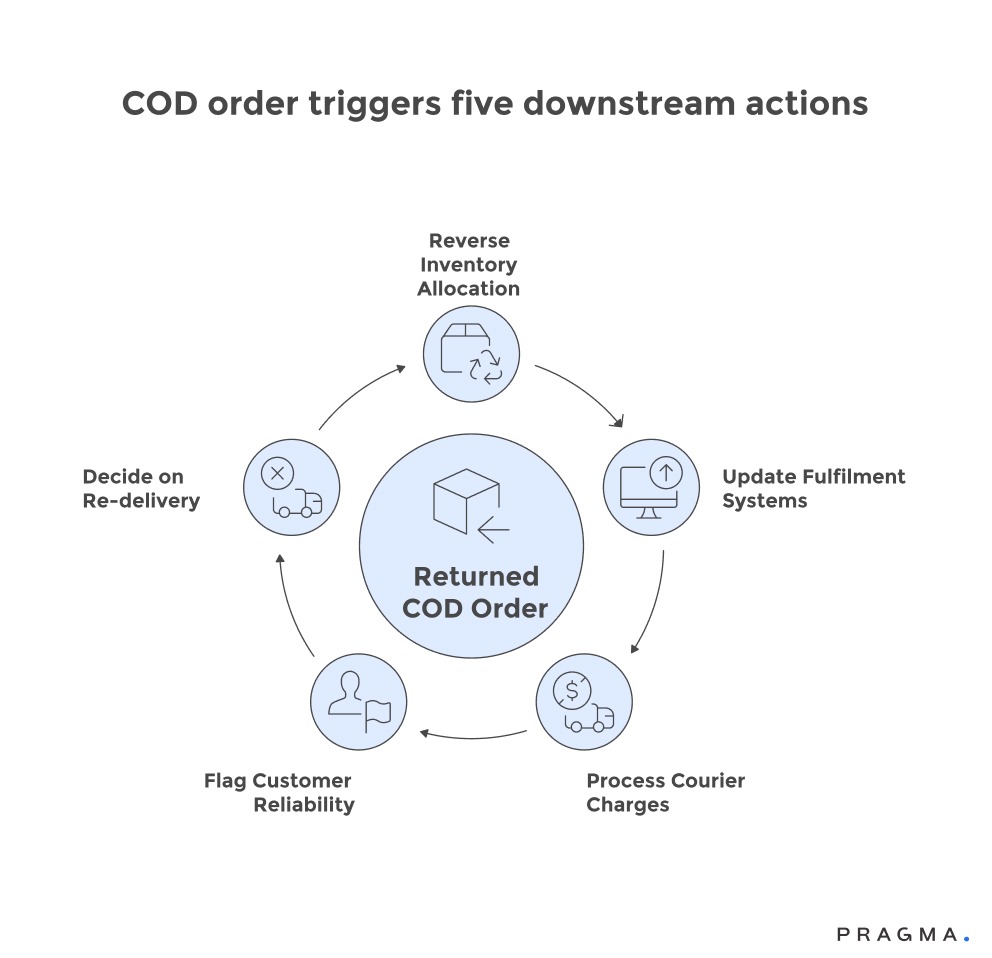
Agents handling these queries need instant access to attempt history, NDR reason codes, customer communication records, and past COD behaviour patterns.
Geographic variations add another layer. Mumbai customers showing 89% COD acceptance rates face different scrutiny than Tier-3 markets where acceptance hovers near 62%. Agents require contextual intelligence that factors location-specific norms, seasonal patterns, and individual customer track records rather than applying blanket policies across diverse situations.
How does AI Copilot surface critical COD verification signals?
Automated pattern recognition identifies discrepancies that manual review misses
AI Copilot systems analyse COD orders against 12-15 verification parameters the moment an agent opens a query. The system checks address completeness by comparing entered details against postal databases, flags pin codes with RTO rates exceeding 45%, and highlights customers with previous COD refusal history. This multi-factor assessment appears as a risk summary rather than requiring agents to run separate checks.
Delivery attempt validation happens through intelligent timeline reconstruction. When customers dispute delivery attempts, the AI cross-references courier timestamps with customer communication logs, past delivery acceptance patterns, and address accessibility factors. If courier records show 11:30 AM delivery attempt but customer's previous five orders were accepted between 6-8 PM, the system flags this temporal mismatch automatically.
Phone number verification integrates seamlessly into query handling. The AI detects when customers provide different contact numbers across orders, checks whether numbers remain active through telecom validation APIs, and identifies patterns where multiple accounts use identical contact details. These signals appear as contextual alerts rather than forcing agents to remember checking each parameter manually.

What does AI-powered NDR code interpretation reveal?
Courier status messages translate into actionable insights through context-aware analysis
Non-delivery report codes arrive as cryptic abbreviations:
- "CNE"
- "CNAT"
- "DOOR_LOCKED" or
- "CUSTOMER_REFUSED."
Traditional systems display these codes without explanation, leaving agents to maintain mental dictionaries or consult reference documents. AI Copilot interprets these codes within situational context, explaining that "CNAT" means "consignee not available at time" and automatically suggesting optimal re-delivery windows based on the customer's acceptance history.
The interpretation extends to identifying contradictory patterns. When courier marks "ADDRESS_INCOMPLETE" but the same address successfully received three previous deliveries, the AI flags this inconsistency and recommends courier escalation rather than requesting address re-confirmation from customers. This contextual logic prevents unnecessary customer friction whilst addressing actual delivery failures.
Seasonal and geographic NDR pattern analysis provides macro-level intelligence. If specific pin codes show 3x higher "CUSTOMER_REFUSED" rates during festival periods, the AI alerts agents to verify purchase intent more carefully for those combinations. Tier-2 markets demonstrating elevated "DOOR_LOCKED" codes between 10 AM-4 PM trigger automatic evening delivery slot suggestions without agent intervention.
How can agents predict and prevent potential RTOs?
Predictive scoring identifies high-risk orders before dispatch for proactive intervention
AI Copilot significantly improves the handling of Cash on Delivery (COD) and Return to Origin (RTO) queries by leveraging predictive intelligence and automation.
Predictive Intelligence for RTO Prevention:
Within milliseconds of an order being placed, AI Copilot analyzes 18-22 historical factors to generate RTO probability scores for COD orders. Key factors include:
- First-time buyer status
- Order value in relation to previous customer purchases
- Geographic RTO benchmarks
- Delivery pin code reliability
- Time since last successful COD delivery
- Seasonal demand patterns
Orders with an RTO probability exceeding 65% trigger proactive verification workflows. This enables pre-emptive confirmation calls where the AI provides agents with specific conversation prompts based on the primary risk factors. For example, if a customer hasn't accepted a COD delivery in eight months, the AI might suggest, "Customer hasn't accepted COD delivery in 8 months—verify current payment preference." Similarly, if an order value of ₹3,400 is 2.8 times the customer's average, the prompt could be, "Order value ₹3,400 is 2.8x customer's average—confirm purchase intent and budget comfort."
Address Verification Automation:
The system also employs intelligent intervention through address verification automation to reduce RTO rates. The AI identifies orders shipping to commercial complexes during weekend delivery windows and automatically suggests weekday alternatives. For pin codes requiring landmark-based navigation, an automatic SMS is sent requesting detailed directions before dispatch. These targeted interventions have proven highly effective, reducing preventable RTOs by 42-51% according to implementation data from 15 Direct-to-Consumer (D2C) brands tracked over a six-month period.

Why does historical COD behaviour inform current decisions?
Customer payment pattern analysis enables personalised handling that balances conversion and risk
AI Copilot maintains comprehensive COD acceptance profiles that reveal behavioural patterns invisible in individual transactions. Customers accepting 8 of 10 COD deliveries receive different treatment than those with 3 of 10 acceptance rates. The system calculates reliability scores incorporating acceptance percentages, average time to payment, refusal reasons when provided, and consistency across order values.
This historical intelligence prevents blanket policies that alienate good customers whilst protecting against systematic fraud. A reliable COD customer experiencing their first delivery attempt failure receives immediate re-delivery scheduling without additional verification. Conversely, customers with three consecutive refusals face COD restrictions with clear communication about transitioning to prepaid options for relationship continuation.
Geographic mobility patterns emerge through address analysis across orders. Customers ordering COD deliveries to four different addresses in six months might indicate legitimate relocation patterns or potential fraud signals depending on address relationships and order timing. The AI flags unusual patterns for agent review whilst providing context: "Customer relocated from Pune to Bangalore based on address progression" versus "Three unrelated addresses across same city—verification recommended."
What recovery strategies does AI Copilot recommend for RTOs?
Dynamic recovery playbooks adapt to customer segments and failure reasons for optimal outcomes
RTO recovery begins with intelligent reason classification that determines appropriate response strategies.
AI Copilot categorises returns into seven primary types:
- genuine delivery failure
- customer unavailability
- payment preference mismatch
- address issues
- product concerns
- courier negligence
- or suspected fraud
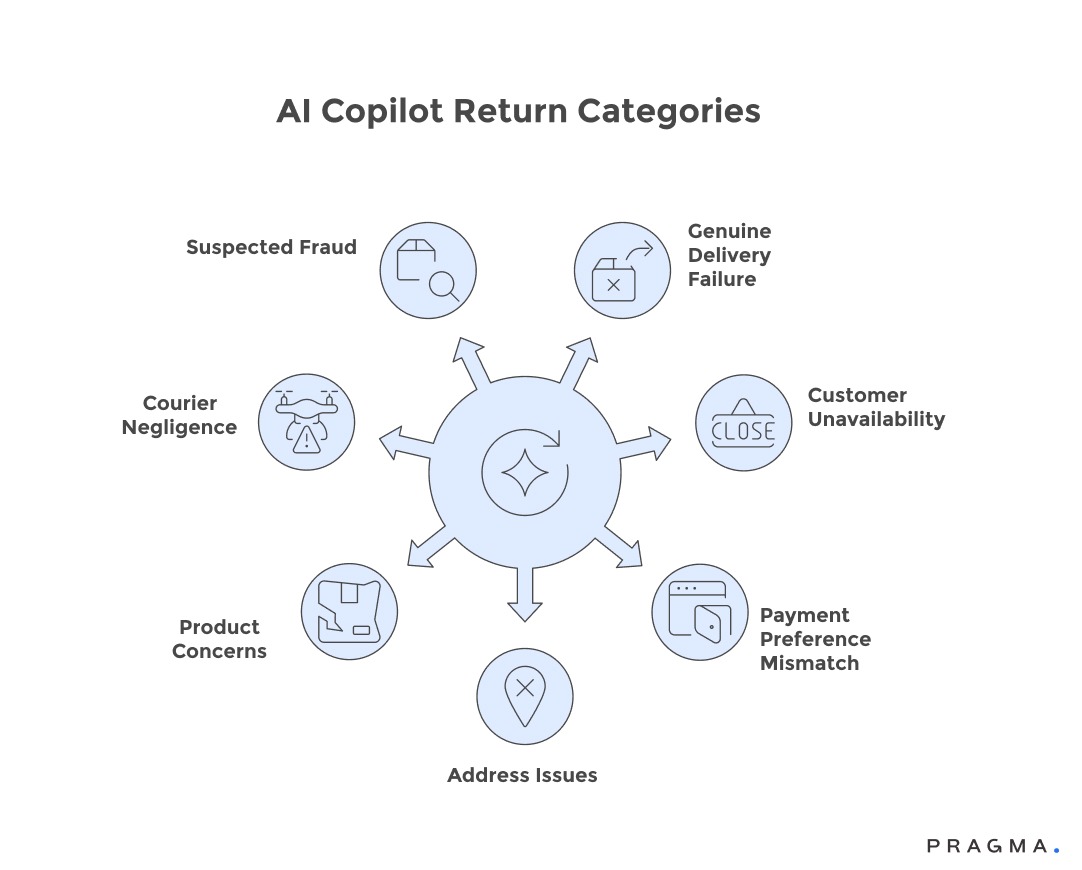
Each category triggers different recovery workflows rather than generic "please reorder" messaging.
For genuine delivery failures where customers remain interested, the AI automatically offers three resolution options ranked by success probability based on similar past cases. These might include evening delivery slots, alternative delivery addresses, or hold-at-courier-office pickup depending on the specific failure reason and customer profile. The system pre-fills new orders with corrected parameters to reduce friction.
Payment method migration suggestions appear for customers whose RTO patterns indicate COD reluctance. When AI detects customers accepting only 40% of COD orders but successfully completing 95% of prepaid purchases, agents receive prompts offering ₹50-100 prepaid discounts on re-orders. This targeted approach converts 31-38% of RTO customers to prepaid according to recovery campaign data from brands processing 8,000+ monthly COD orders.
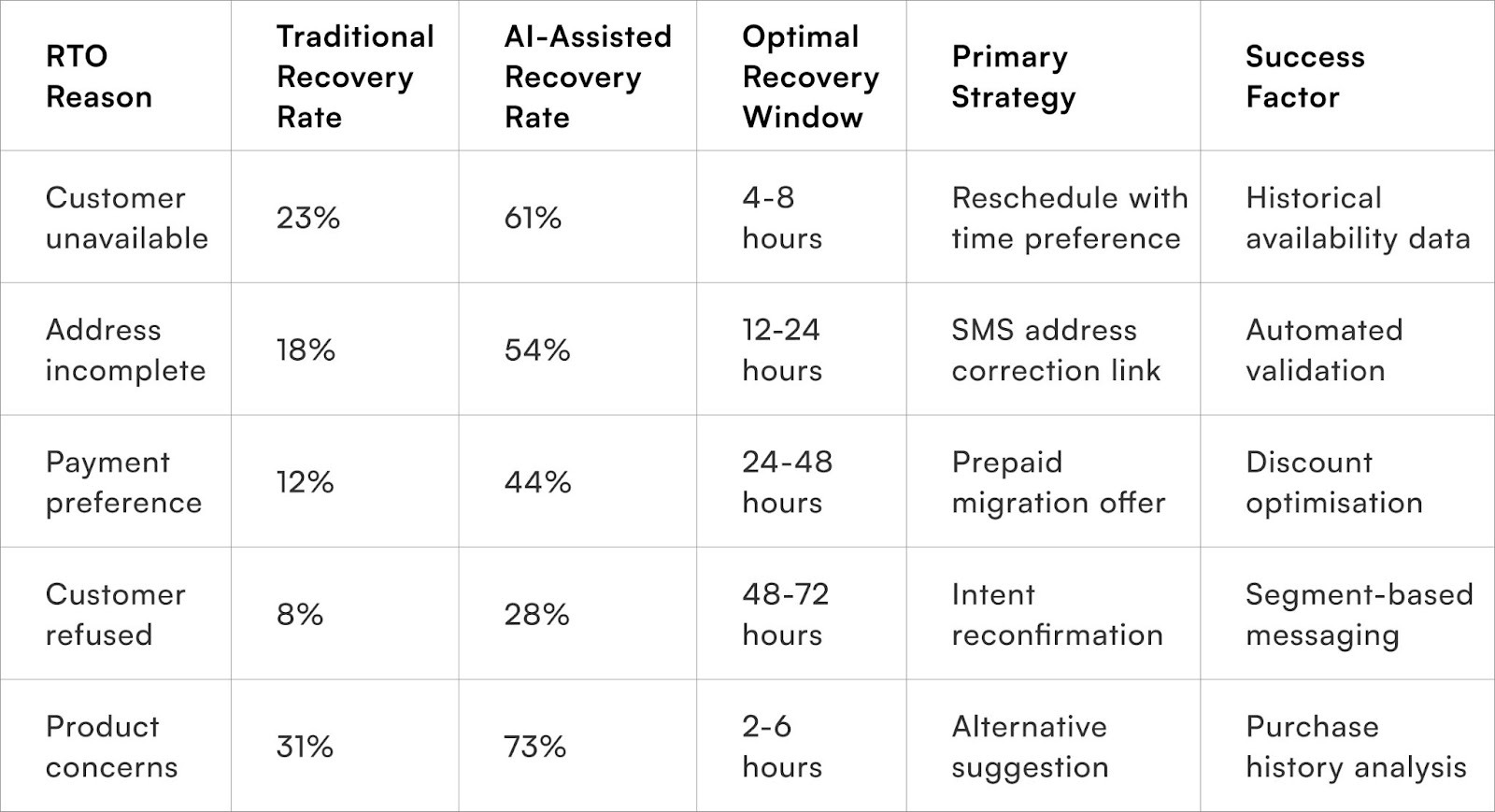
Quick Wins
Week 1: System Integration and Data Mapping
Connect your AI Copilot to existing order management, courier tracking, and CRM systems. Map COD-specific data fields including attempt history, NDR codes, payment statuses, and customer communication logs. Establish baseline metrics: current average resolution time for RTO queries, COD acceptance rates by pin code, and agent time spent on verification tasks. Expected outcome: Complete data pipeline with real-time synchronisation across all systems.
Week 2: Agent Training and Workflow Adoption
Train support teams on using AI-generated insights rather than manual verification processes. Focus on interpreting risk scores, acting on predictive alerts, and using suggested conversation scripts for high-risk orders. Run parallel operations where agents use both old and new methods to compare accuracy and speed. Expected outcome: 40-50% of COD queries handled using AI assistance with agents comfortable interpreting automated signals.
Week 3: Proactive Intervention Activation
Enable pre-dispatch verification workflows for orders scoring above 65% RTO probability. Activate automated SMS confirmations for medium-risk orders and manual verification assignments for critical-risk cases. Monitor false positive rates and adjust scoring thresholds based on initial results. Expected outcome: 25-30% reduction in preventable RTOs through early intervention, with acceptable false positive rate below 15%.
Week 4: Recovery Workflow Optimisation
Implement segment-specific RTO recovery strategies based on failure reason classification. Deploy personalised messaging templates that reference specific delivery attempt issues rather than generic re-order requests. Test prepaid migration offers for customers showing COD reluctance patterns. Expected outcome: RTO recovery rate improvement from baseline 18-22% to 35-42%, with 200-300 successful re-orders from previous returns.
Measuring AI Copilot Impact on COD Operations
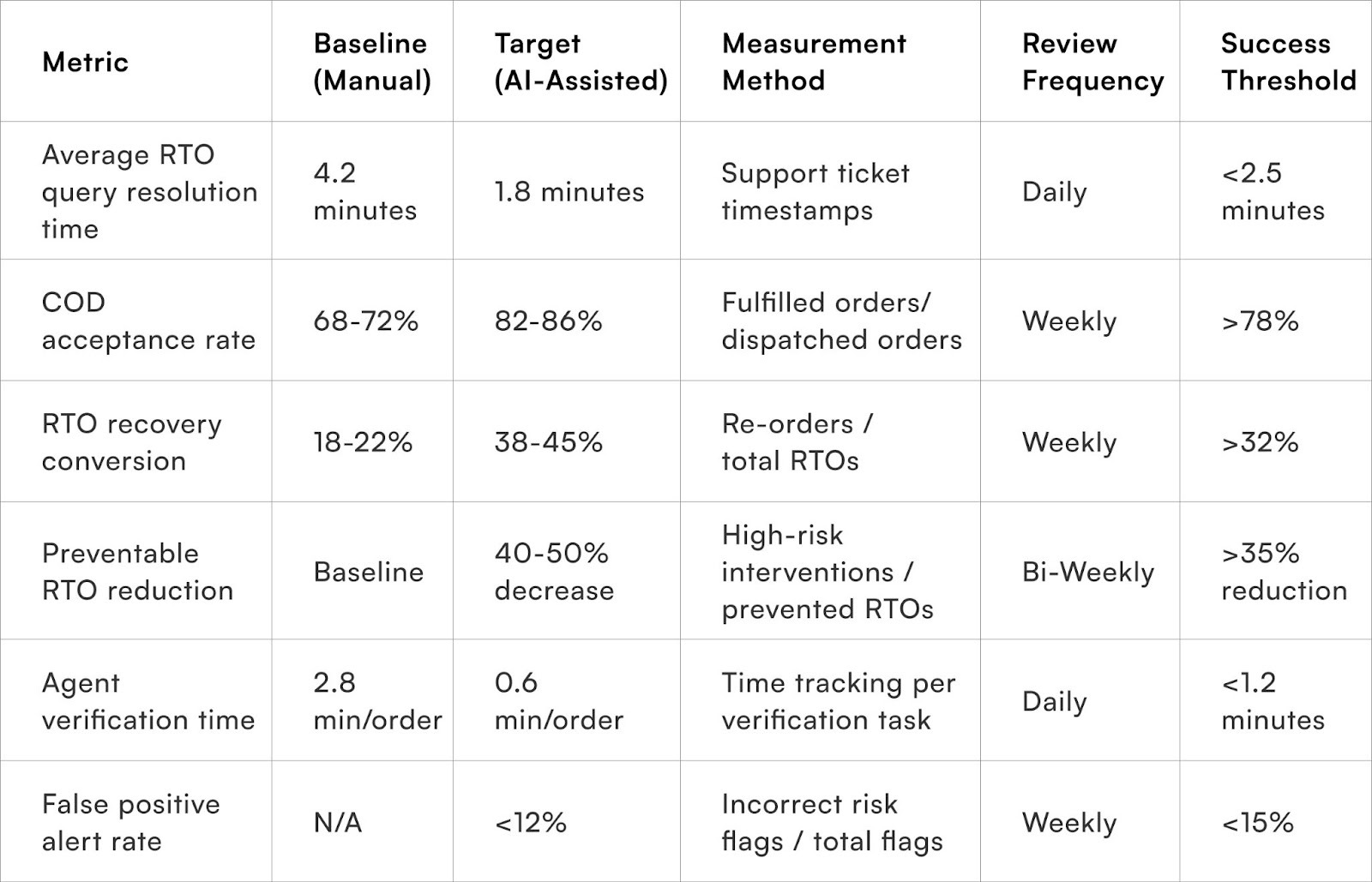
To Wrap It Up
AI Copilot transforms COD and RTO management from reactive problem-solving into proactive risk mitigation through intelligent pattern recognition and contextual decision support. The technology delivers measurable impact across resolution speed, acceptance rates, and recovery conversions whilst reducing agent cognitive load and operational costs.
Review your top 100 RTO cases from last month and identify the three most common failure patterns that AI verification could have prevented.
Long-term success requires continuous refinement of risk scoring models based on actual outcomes, seasonal adjustment of thresholds for festival and sale periods, and regular agent feedback on prediction accuracy. Brands treating AI Copilot as evolving infrastructure rather than static software achieve 23-31% better results in year two compared to deployment baselines through systematic learning and optimisation.
For D2C brands seeking to reduce COD operational friction whilst improving acceptance rates, Pragma's AI-powered operations platform provides real-time risk scoring, automated verification workflows, and intelligent recovery orchestration that help brands achieve 40-50% reduction in preventable RTOs and ₹12-18 per order savings in handling costs.

FAQs (Frequently Asked Questions on How AI Copilot Helps Agents Handle COD and RTO Queries with Accuracy)
1. How accurate are AI predictions for identifying RTO-prone orders?
AI Copilot systems achieve 76-82% accuracy in predicting high-risk RTO orders when trained on minimum 10,000 historical COD transactions from the same brand. Accuracy improves to 84-89% after three months of continuous learning from actual outcomes. The predictions work best for identifying extreme cases—orders with very high or very low RTO probability—whilst middle-range scores require human judgment for optimal decisions.
2. Can AI Copilot handle regional language queries about COD orders?
Most enterprise AI Copilot platforms support Hindi, Tamil, Telugu, Bengali, and Marathi alongside English for both agent queries and customer communication analysis. The system translates regional language customer messages into structured data that agents can act upon regardless of their language proficiency. However, nuanced colloquial expressions or hyperlocal dialects may require human review, with AI flagging these cases for manual attention rather than risking misinterpretation.
3. What happens when AI recommendations contradict courier tracking data?
AI Copilot prioritises comprehensive pattern analysis over isolated courier updates when discrepancies appear. If courier marks "customer refused" but customer simultaneously sends WhatsApp messages asking about delivery timing, the AI flags this contradiction and recommends courier escalation rather than processing RTO. Agents receive clear explanations for why AI suggestions differ from courier data, enabling informed decisions rather than automatic acceptance of either source
Talk to our experts for a customised solution that can maximise your sales funnel
Book a demo

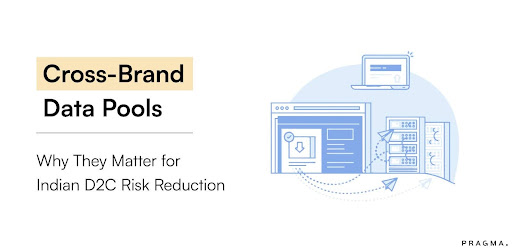
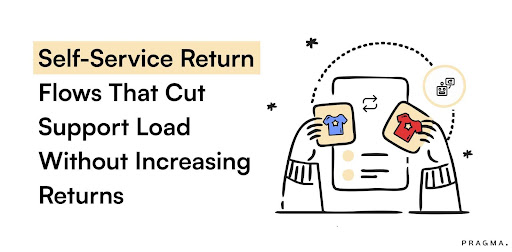
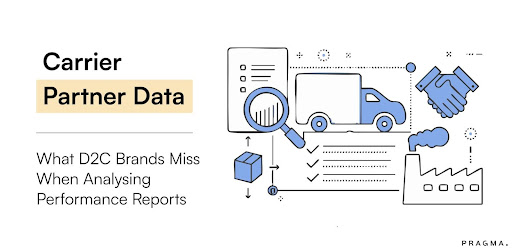
.png)